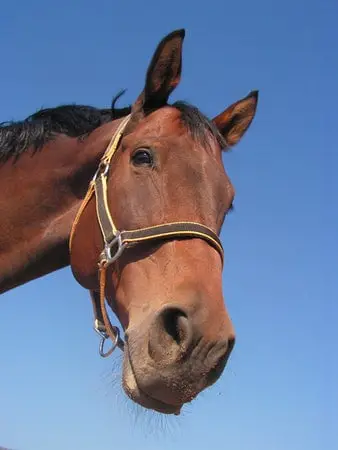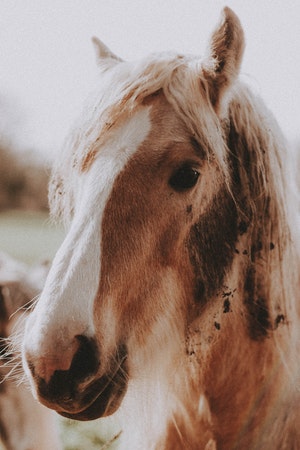Almost every rule has an exception and even though it’s actually possible for horses to get fleas, it is still very rare for healthy horses to encounter problems with fleas. This refers to a horse displaying outwardly signs of having fleas. The signs usually show raw skin after scratching the surface to ease the flea bites.
There are horses that will get a handful of fleas in their lifetime, but in these cases, the fleas are most likely making use of the horse as a temporary stop between hosts and not as a host in particular.
Horses normally don’t have the problem of fleas because they aren’t furry and don’t spend a considerable amount of time on the ground. Fleas are more drawn to hosts that stay in dens or nests so they can have an environment warm enough to breed.
How Do Horses Get Fleas?
Even though horses don’t normally have the problem of fleas, they can become temporary hosts for different reasons. Fleas are dogged and equally opportunistic. They can wait – without even eating – for several months for a new host. If your horse isn’t lucky, they might become that new host.
It is actually quite easy for a horse to attain temporary host status. For instance, your horse might have ridden through a place with long grasses that a dog or fox passed through. This animal might have been gone a long time, but flea eggs may have hatched and have been waiting for a fresh host. The fleas will not stay on the horse for long and will probably travel from them to a more furry host.

Another common way that horses might get fleas is by coming in contact with other animals like dogs and cats. A lot of us have dogs that act as security or cats that help to reduce the population of rats. These animals can carry up to 20 fleas and you can understand how and why some of them might end up on your horse.
Can Horses Get Fleas From Dogs And Cats?
It isn’t a secret that fleas are mostly host-specific. This means that they live on a species or a group of species. It also means that even though they will be able to feed on a different species, they cannot reproduce. This ensures that it is highly unlikely that a horse will suffer from dog or cat fleas. Even with this, if a dog or cat is fond of your horse, then there’s a higher possibility that some fleas might have made their way to the horse.
This isn’t really a big issue since these fleas are host-specific. What this means is that they will not lay any eggs on the horse. Most of the time, you can easily brush them off the horse’s coat. You can do this with your hand or while the horse is being groomed. You can also decide to wash the fleas out of the horse’s coat, however, make sure that you properly dry the horse after this is done.
Even though fleas are specific to species, they can still transfer hosts. Dog fleas are different to cat fleas, but they will bite horses and even humans. Even though it is rare for horses to get fleas from animals like dogs, exceptions occur sometimes.
How Can You Ensure That A Horse Doesn’t Get Fleas?
The most effective way of preventing your horse from coming in contact with fleas is by curbing the issue from the source. You can do this by treating the dogs and cats for fleas – and other animals that have access to your horse. Doing this will ensure that they cannot get on your horses in the first instance.
If this cannot be attained for one reason or the other, there’s still something that can be done. Ensure that your horse consumes a properly balanced diet accompanied by a garlic supplement (fresh garlic shouldn’t be given to horses). This will help to repel fleas and even flies. Another way to prevent fleas is by grooming your horse every day.
How Can You Get Rid Of Fleas?
For healthy horses, they will most likely not suffer from fleas. However, if they manage to get fleas from a dog or cat, they will likely fall off in two days at most. If you actively want to get rid of fleas, then thoroughly grooming the horse and applying some fly repellent should be enough.

If you want to apply a natural alternative, then you can decide to create your own. Just boil water and once it is boiling, put a whole sliced lemon (with the rind and all). Keep it covered for up to 10 hours. When applying it, you can make use of a sponge or you can transfer it into a spray bottle. The major reason why this natural alternative works is that the juice in the lemon’s rind has a chemical compound known as d-limonene that has insecticide abilities. It is even used in the manufacturing process of repellents you can get over the counter.
Why Don’t Horses Generally Suffer From Fleas?
A lot of animals with fur have flea problems, so one might think horses have evolved their coat to deter fleas, but this is not the case. To understand the reason why horses generally don’t have a flea problem, you have to have an idea of a flea’s lifecycle.
An adult flea lays close to twenty eggs (this can be on a daily basis). When the host moves, the egg will fall off. These eggs will be able to stay in that position for two weeks and then develop into larvae. Later, this larvae will develop into pupae. This pupae will then return to the host or find a new host and the cycle begins again.
One remarkable thing we’ve found out over the years is that fleas cannot live in wood chipping, straw or any kind of horse bedding. This is one of the reasons why fleas haven’t evolved to be able to live permanently on horses. Additionally, due to the fact that horses don’t make dens or nests, fleas won’t have places that are habitable for their eggs.

